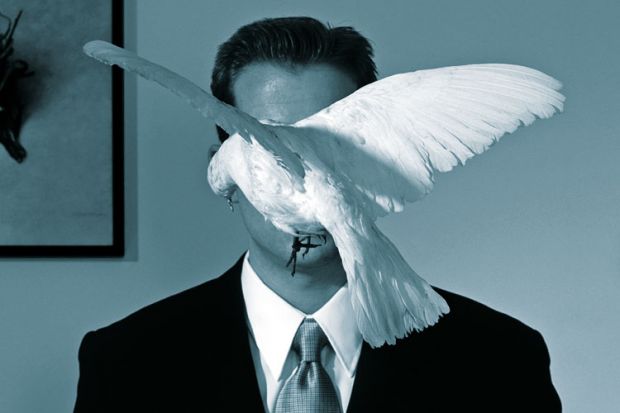Hey, everybody! Look at me!
“There were only two or three doves actually in the air. The rain meant that the rest of them wouldn’t leave the release basket.”
That was how Dr F. R. Beavis, one of our leading second-rate professors of English and related studies, responded to criticism of the manner in which he had chosen to celebrate the news that his article on “The semiotic role of the phaeton carriage in Emma” had been accepted for publication by the top-rated British Journal of Middle-Period Jane Austen Studies (Vol. 146, pp. 104-142).
But this admission was not enough to pacify Jamie Targett, our Director of Corporate Affairs, who insisted that Dr Beavis’ dove release had “fundamentally failed” to conform to the university’s new Gender Equality Self-Promotion Policy.
This policy was adopted following research into mid-career academic women by the Leadership Foundation for Higher Education, which revealed that men were more likely to prosper in their academic careers because of their greater tendency towards communicating “their success more loudly than women”.
In this context, insisted Targett, even a few airborne doves constituted excessive self-promotion. Neither had Dr Beavis’ case been helped by his alleged rendering of “You’ve got to search for the hero inside yourself” in the senior common room of Richard Dawkins College, nor by his decision to have the name plate on the door of his tutorial office illuminated by a revolving spotlight.
But has Poppleton’s new gender equality policy on self-promotion helped to accord greater recognition to mid-career female academics? Targett told The Poppletonian that he didn’t want to sound too complacent but he had certainly bumped into just such a member of academic staff only the other day and had been “very close” to remembering her actual name.
Write on both sides of the paper
In a recent article in Times Higher Education, Karen Harris, tutor of English for academic purposes at the University of the Arts, described the traditional student essay as a “tired, restrictive form” and suggested it was due for replacement by more dynamic methods of communicating ideas. The Poppletonian decided to widen the debate by asking one of our leading educationalists, Dr T. K. Macks, for his views on the subject. Here is his response.
I’d like to make a strat start by saying that this is a very important question that I personally have myself thought about quite a lot since I got back from my holidays where I had a really super time going swimming in the sea which was quite warm for the time of year. And then I ate lots of different kinds of food and other things that you wouldn’t find in restorants at home where you have English food. And then I also had an ice cream with three different flavours and then I went to bed and woke up to another day. So all in all I had a very nice time during my holidays and I’m already looking forward to the next one which will be next year. That’s my opinion, anyway.
Thought for the week
(contributed by Jennifer Doubleday, Head of Personal Development)
I am profoundly aware of the substantial new research findings on the deleterious effects of “Mindfulness”. If you feel worried that your attendance at one of our Mindfulness seminars might have affected you adversely then please contact the Personal Development Centre, assuming, of course, that after having been on a Mindfulness course you are still capable of remembering that you’ve been on a Mindfulness course.
Register to continue
Why register?
- Registration is free and only takes a moment
- Once registered, you can read 3 articles a month
- Sign up for our newsletter
Subscribe
Or subscribe for unlimited access to:
- Unlimited access to news, views, insights & reviews
- Digital editions
- Digital access to THE’s university and college rankings analysis
Already registered or a current subscriber? Login
